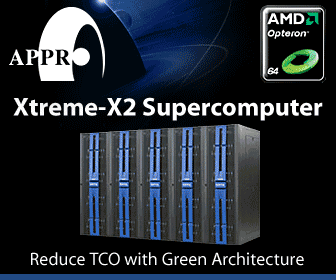GOVERNMENT
Mitrionics' Co-Founder to Discuss Acceleration Technologies at HP-CAST
Mitrionics, developer of the Mitrion Virtual Processor and the Mitrion Software Acceleration Platform, today announced that Stefan Möhl, Mitrionics’ co-founder and Chief Scientific Officer, will present and discuss the latest accelerated computing technologies and platforms at the Hewlett-Packard Consortium for Advanced Scientific and Technical (HP-CAST) computing users group meeting. The meeting and conference is being held at the Grand Hyatt Singapore, in Singapore, Asia this May 19-22, 2008. Mr. Möhl’s presentation titled, “Next Generation of Accelerators: Turf war or collaboration.”, will discuss acceleration platforms and strategies for Green Computing and Hybrid Computing based on FPGAs (Field Programmable Gate Arrays), GPGPUs (General-Purpose computation on GPUs), and multi-core CPUs.  The HP-CAST user group works to increase the capabilities of HP solutions for large-scale, scientific and technical computing. HP-CAST provides guidance to HP on the essential development and support issues for such systems. HP-CAST meetings typically include corporate briefings and presentations by HP executives and technical staff (under NDA), and discussions of customer issues related to high-performance technical computing. “FPGA-accelerated computing is entering a new paradigm as processor companies like AMD and Intel and major system vendors such as Hewlett-Packard have opened the core of their systems for support of FPGAs and other hardware acceleration platforms,” said Stefan Möhl, co-founder and chief scientific officer of Mitrionics, Inc. “Broader market adoption of accelerated computing solutions will come when hybrid computing strategies and applications emerge to effectively leverage the synergies of all the different acceleration platforms and processors."
The HP-CAST user group works to increase the capabilities of HP solutions for large-scale, scientific and technical computing. HP-CAST provides guidance to HP on the essential development and support issues for such systems. HP-CAST meetings typically include corporate briefings and presentations by HP executives and technical staff (under NDA), and discussions of customer issues related to high-performance technical computing. “FPGA-accelerated computing is entering a new paradigm as processor companies like AMD and Intel and major system vendors such as Hewlett-Packard have opened the core of their systems for support of FPGAs and other hardware acceleration platforms,” said Stefan Möhl, co-founder and chief scientific officer of Mitrionics, Inc. “Broader market adoption of accelerated computing solutions will come when hybrid computing strategies and applications emerge to effectively leverage the synergies of all the different acceleration platforms and processors."
 The HP-CAST user group works to increase the capabilities of HP solutions for large-scale, scientific and technical computing. HP-CAST provides guidance to HP on the essential development and support issues for such systems. HP-CAST meetings typically include corporate briefings and presentations by HP executives and technical staff (under NDA), and discussions of customer issues related to high-performance technical computing. “FPGA-accelerated computing is entering a new paradigm as processor companies like AMD and Intel and major system vendors such as Hewlett-Packard have opened the core of their systems for support of FPGAs and other hardware acceleration platforms,” said Stefan Möhl, co-founder and chief scientific officer of Mitrionics, Inc. “Broader market adoption of accelerated computing solutions will come when hybrid computing strategies and applications emerge to effectively leverage the synergies of all the different acceleration platforms and processors."
The HP-CAST user group works to increase the capabilities of HP solutions for large-scale, scientific and technical computing. HP-CAST provides guidance to HP on the essential development and support issues for such systems. HP-CAST meetings typically include corporate briefings and presentations by HP executives and technical staff (under NDA), and discussions of customer issues related to high-performance technical computing. “FPGA-accelerated computing is entering a new paradigm as processor companies like AMD and Intel and major system vendors such as Hewlett-Packard have opened the core of their systems for support of FPGAs and other hardware acceleration platforms,” said Stefan Möhl, co-founder and chief scientific officer of Mitrionics, Inc. “Broader market adoption of accelerated computing solutions will come when hybrid computing strategies and applications emerge to effectively leverage the synergies of all the different acceleration platforms and processors." 